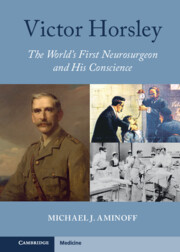Book contents
- Victor Horsley
- Victor Horsley
- Copyright page
- Dedication
- Contents
- Preface
- Acknowledgments
- Chapter 1 Early Days
- Chapter 2 The Other Side of Gower Street
- Chapter 3 At the Brown
- Chapter 4 Dividing the Indivisible: The Localization of Cortical Functions
- Chapter 5 The Making of a Specialty
- Chapter 6 The Grammar of Neurosurgery: Technical Underpinnings
- Chapter 7 The Neurosurgery of Specific Disorders
- Chapter 8 Measures of the Man
- Chapter 9 The Politics of Protection
- Chapter 10 Not So Trivial Pursuits: The Slide into Politics
- Chapter 11 Antivivisectionist Claims and Clamor
- Chapter 12 Bitter Tears: Horsley and the Suffragist Movement
- Chapter 13 Last Orders: The Temperance Movement
- Chapter 14 Syphilis and the Public Health
- Chapter 15 A Surgeon Goes to War
- Chapter 16 Aftermaths and Appraisals
- Book part
- Index
- References
Chapter 13 - Last Orders: The Temperance Movement
Published online by Cambridge University Press: 06 January 2022
- Victor Horsley
- Victor Horsley
- Copyright page
- Dedication
- Contents
- Preface
- Acknowledgments
- Chapter 1 Early Days
- Chapter 2 The Other Side of Gower Street
- Chapter 3 At the Brown
- Chapter 4 Dividing the Indivisible: The Localization of Cortical Functions
- Chapter 5 The Making of a Specialty
- Chapter 6 The Grammar of Neurosurgery: Technical Underpinnings
- Chapter 7 The Neurosurgery of Specific Disorders
- Chapter 8 Measures of the Man
- Chapter 9 The Politics of Protection
- Chapter 10 Not So Trivial Pursuits: The Slide into Politics
- Chapter 11 Antivivisectionist Claims and Clamor
- Chapter 12 Bitter Tears: Horsley and the Suffragist Movement
- Chapter 13 Last Orders: The Temperance Movement
- Chapter 14 Syphilis and the Public Health
- Chapter 15 A Surgeon Goes to War
- Chapter 16 Aftermaths and Appraisals
- Book part
- Index
- References
Summary
In 1911, when the Daily Mail announced that Horsley had won the international Lallelongue Prize for surgery, it added a personal anecdote. At his club, a friend had asked him whether he could say what whisky was. “Certainly,” remarked Sir Victor, “it is the most popular poison in the world.”1 Horsley is remembered for his strong views on alcohol and for his monumental row about its effects with Karl Pearson, a man who was as fond of controversy and as outspoken as Horsley. Pearson, professor of applied mathematics (and later the first Galton professor of eugenics) at University College, had established there a biometrics laboratory and the Francis Galton Laboratory for National Eugenics and was interested in the relative importance of heredity and environmental factors in evolution.
- Type
- Chapter
- Information
- Victor HorsleyThe World's First Neurosurgeon and His Conscience, pp. 143 - 150Publisher: Cambridge University PressPrint publication year: 2022



